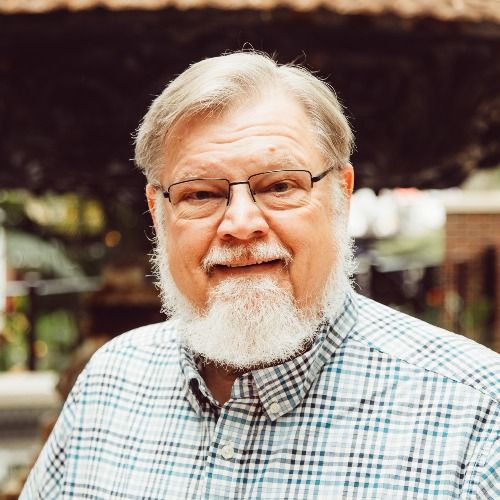Episode 936
Faith in Action: Understanding James 2:14-26
The "Daily Bible Refresh" is presented each day by Rev. Dr. Brad Miller who has a goal of speaking a bit of the bible into two million ears (one million people) in three years (2025-2028).
He is the author of "The A, B, C-1,2,3 Bible Study Guide" Free to you by clicking HERE.
Brad served as a local church pastor for forty years and has a background in radio and podcasting. Moreover, he is a life-long student of The Bible.
He believes in the words of Jesus that “scripture is fulfilled in your hearing” (Luke 4:21)
The "Daily Bible Refresh" is available seven days a week by 6:00 am ET. The episodes are no longer than ten minutes long and are...
- Understandable: A reading from the New Testament (usually the Gospel) selected from the Revised Common Lectionary using "The Message" translation.
- Relatable: You will have a couple of "points to ponder" from the text which will relate to your life
- Applicable: Every episode includes a way you can take action based on the reading
- A recommended resource to help you go deeper in biblical study and spiritual direction.
- A prayer for your day.
A companion resource to the Voice of God Daily Podcast is the “ABC Bible Study Guide” available by clicking HERE.
The "Daily Bible Refresh" is available every day at VoiceofGodDaily.com on Apple Podcasts, Spotify and all major podcast directories.
You can help Dr. Brad attain his goal of getting a bit of the bible into two million ears by subscribing to "Daily Bible Refresh" on Apple Podcasts, leaving a five-star rating, and writing a review. More importantly please share with your network of family and friends about the "Daily Bible Refresh".
Please make listening to the "Daily Bible Refresh" a part of your daily life.
Remember… “All scripture is God-breathed and useful”(2 Timothy 3:16)
The discourse presented in this episode encapsulates a profound theological exploration of faith and its manifestation through action, as delineated in the epistle of James, chapter 2, verses 14 through 26. The speaker elucidates the critical intersection between belief and deeds, positing that mere verbal professing of faith without accompanying actions is fundamentally insufficient and, in fact, constitutes a form of spiritual hypocrisy. The speaker underscores the notion that faith devoid of works is not merely ineffective; it is described as 'outrageous nonsense.' This provocative assertion challenges listeners to reflect on the authenticity of their faith in light of their actions, particularly in a contemporary context where performative activism often prevails over genuine engagement.
A pivotal aspect of this discourse is the illustration of faith through the examples of biblical figures such as Abraham and Rahab, whose actions epitomize a harmonious blend of faith and works. The speaker emphasizes that Abraham's righteousness before God was not merely a matter of belief but was intrinsically linked to his willingness to act upon that belief. Similarly, Rahab's courageous actions, despite her marginalized status, serve as a testament to the idea that authentic faith is often found in the most unexpected places. The speaker encourages listeners to consider who they might overlook in their own faith journeys and to seek out those whose actions reflect true faith, irrespective of societal judgments.
In summation, the episode invites an introspective examination of one's faith practices, urging a shift from passive belief to active participation in the lives of others. The speaker concludes with a compelling call to action, urging listeners to transform their thoughts and prayers into tangible efforts that address systemic injustices and support those in need. This transformative approach to faith not only enriches the believer's spiritual journey but also fosters a deeper connection to the broader community, embodying the essence of what it means to live out one's faith authentically and effectively.
The exploration of the Scriptures in this episode delves into the intricate relationship between faith and works as articulated in the book of James. The speaker methodically dissects the text, emphasizing that authentic faith cannot exist in isolation from action. The crux of the discussion revolves around the assertion that faith without accompanying deeds is not merely ineffective; it is a hollow expression that fails to reflect the transformative power of belief. Through poignant examples, the speaker illustrates how the biblical narrative challenges contemporary believers to move beyond mere verbal affirmations of faith towards actionable commitments that create meaningful change in the world.
The speaker's analysis of the passage raises critical questions regarding the effectiveness of religious rhetoric in the absence of concrete action. In a world inundated with performative displays of faith, the call to embody one's beliefs through acts of compassion and justice resonates profoundly. The speaker critiques the tendency to offer platitudes in times of crisis, urging listeners to recognize that such empty words can perpetuate cycles of harm rather than foster genuine support. This call to accountability is particularly salient in the context of social media activism, where the disparity between online expressions of solidarity and real-world actions often comes into sharp relief.
Moreover, the episode underscores the significance of embodied faith, suggesting that true belief manifests itself through tangible support for those in need. By highlighting figures such as Abraham and Rahab, the speaker illustrates that faith is intrinsically linked to action, thus inviting listeners to consider how their own lives reflect this integration of belief and practice. The discussion culminates in a practical call to action, encouraging individuals to identify specific issues in their communities where they can translate their faith into impactful actions, thereby fostering a more just and compassionate society.
The theological discourse presented herein engages with the epistle of James, particularly focusing on the profound implications of faith as it relates to works, as articulated in James 2:14-26. The speaker articulates a compelling argument that posits faith devoid of corresponding actions is not only inadequate but constitutes a disservice to the very essence of belief. This episode serves as a clarion call for believers to transcend the confines of performative faith, urging a deeper and more meaningful engagement with the world around them.
Central to this discussion is the speaker's examination of the biblical narrative, which emphasizes that genuine faith is inextricably linked to action. The speaker invokes the examples of Abraham and Rahab, illustrating that their respective acts of faith were not mere endorsements of belief but rather expressions of their commitment to live out that belief through decisive actions. This highlights a crucial aspect of the Christian faith: that authentic belief inevitably manifests in deeds that reflect love, justice, and compassion. The speaker's insights challenge contemporary believers to confront the pervasive culture of empty religious rhetoric that often substitutes genuine action, particularly in an era marked by social media activism and superficial expressions of concern.
As the episode unfolds, the speaker encourages listeners to engage in self-reflection regarding their own faith practices, advocating for a shift towards embodied solidarity and tangible support for marginalized communities. The call to action is both urgent and necessary, inviting individuals to critically assess their responses to societal issues and to commit to actions that extend beyond thoughts and prayers. This transformative journey towards a faith that is alive and active not only enriches the individual believer but also serves to uplift and empower those who are often overlooked in the discourse of faith. Through this lens, the episode ultimately seeks to inspire a radical reimagining of what it means to live out one's faith in a world longing for authentic expressions of love and justice.
Takeaways:
- The juxtaposition of faith and works is essential, as they are inextricably linked, akin to body and spirit.
- Empty religious expressions devoid of actionable support are not merely ineffective; they constitute a form of systemic violence.
- The narrative of Abraham illustrates that true faith is characterized by tangible acts of obedience and commitment to God's will.
- In the face of contemporary challenges, our faith calls us to engage fully with the world, transcending mere verbal affirmations.
- James elevates Rahab as an exemplar of authentic faith, challenging conventional perceptions of righteousness and virtue.
- Our spiritual journey must compel us to transform thoughts and prayers into concrete actions that effect tangible change in society.
Links referenced in this episode:
Companies mentioned in this episode:
- voiceofgoddaily.com
Transcript
Beyond Thoughts and Faith that transforms A Study of James 2:14 26 on the Daily Bible refresh with Dr. Brad Miller hello my good friends.
Speaker A:Dr. Brad Miller here with the Daily Bible Refresh.
Speaker A:Your daily visit into the New Testament of the Bible from a progressing perspective.
Speaker A:We made the reading of the Bible understandable.
Speaker A:We use the Message version relatable.
Speaker A:We give you some points to ponder and applicable.
Speaker A:We give you an action step to follow with a prayer.
Speaker A:We do all that in under 10 minutes or so.
Speaker A:It's all brought to you by voiceofgoddaily.com that's the home of the ABC 1, 2, 3 Bible study method.
Speaker A:We take the Revised Common Lectionary, which is the daily reading of the Bible.
Speaker A:We're in year C of a three year cycle, the Pentecost season, and we bring it to you.
Speaker A: on years, a million people by: Speaker A:Here's our reading for the day from James 2:14 26.
Speaker A:Reading from the Message it's about faith in action.
Speaker A:Dear friends.
Speaker A:Do you think you'll get anywhere in this if you learn all the right words but never do anything?
Speaker A:Does merely talking about faith indicate that a person really has it?
Speaker A:For instance, you come upon an old friend dressed in rags and half starved and say, good morning friend, be clothed in Christ, be filled with the Holy Spirit and walk off without providing so much as a coat or a cup of soup.
Speaker A:Where does that get you?
Speaker A:Isn't it obvious that God talk of without God acts is outrageous nonsense.
Speaker A:I can already hear one of you agreeing by saying, sounds good.
Speaker A:You take care of the faith department, I'll handle the works department.
Speaker A:Not so fast.
Speaker A:You can no more show me your works apart from your faith than I can show you my faith apart from my works.
Speaker A:Faith and works, Works and faith fit together like hand and glove.
Speaker A:Do I hear you professing to believe in the one and only God, but then observe your complete complacency sitting back as if you had done something wonderful.
Speaker A:That's just great.
Speaker A:Demons do that, but what good does it do them?
Speaker A:Use your heads.
Speaker A:Do you suppose for a minute that you can cut faith in works in two and not end up with a corpse on your hands?
Speaker A:Was our ancestor Abraham made right with God by works when he placed his son Isaac on the sacrificial altar?
Speaker A:Wasn't it obvious that faith and works are yoked partners?
Speaker A:That faith expression itself in works?
Speaker A:That the works are works of faith?
Speaker A:The full meaning of believe in the scripture sentence Abraham believed God and was set right with God includes his action.
Speaker A:It's that weave of believing and acting that got Abraham named God's friend.
Speaker A:It is not evident that a person is made right with God not by a barren faith, but by faith fruitful in works.
Speaker A:The same with Rahab, the Jericho harlot.
Speaker A:Wasn't her action in hiding God's spies and helping them escape that seamlessly unity of believing and doing what counted with God?
Speaker A:The very moment you separate body and spirit, you end up with a corpse.
Speaker A:Separate faith and works.
Speaker A:Separate faith and works and you get the same thing, a corpse.
Speaker A:Wow, what a profound passage of scripture from the book of James.
Speaker A:And so we're exploring this challenge to us by going beyond performative faith to transformative action.
Speaker A:And here James is addressing really a timeless issue, the gap between religious talk and meaningful action.
Speaker A:And I think his words are particularly relevant in our age of social media activism and the thoughts and prayers that so many people respond to in crisis without doing anything.
Speaker A:Here are some points to ponder.
Speaker A:The violence of empty words.
Speaker A:James doesn't just suggest that empty religious words are ineffective.
Speaker A:He calls them outrageous nonsense.
Speaker A:So when we offer spiritual platitudes to those in need, without tangible support, we're not just being unhelpful, we're participating in systematic violence.
Speaker A:How do our comfortable religious phrases sometimes serve as barriers to real engagement with suffering?
Speaker A:The second point is about embodied solidarity.
Speaker A:The text here presents faith and works as inseparable as body and spirit weaved together.
Speaker A:The scripture says this isn't about earning salvation through good deeds.
Speaker A:It's about understanding that authentic faith naturally manifest in action.
Speaker A:In our current context of all the crisis that we have going on in our world climate, racial injustice, economic inequality, political instability.
Speaker A:How does our faith call us to show up with our whole selves?
Speaker A:Another point is about unexpected prophets.
Speaker A:James here lips up Rahab.
Speaker A:She was a sex worker and a foreigner, and she lifts her up as an example of faith, of authentic faith.
Speaker A:This radically challenges what we often consider in our life faithful today, where we might find examples of authentic faith in action from those in our religious institutions often marginalize or ignore.
Speaker A:What can we learn from activists, organizers and communities which are on the margins?
Speaker A:Here's your action step.
Speaker A:Examine your thoughts and prayers, the responses you may make, which are just platitudes, and choose an issue where you regularly may have thoughts and prayers about and do something about it.
Speaker A:Maybe post about it on social media, or take some action to support some organization financially with time or service.
Speaker A:Research the organizations that are led directly by affected communities and address whatever issue they are trying to address.
Speaker A:And maybe commit a period of time, a month, three months, to somehow support them, not only through your thoughts and prayers, but through your action, through your financial contribution, your volunteer time, or somehow using your privilege or your power to affect change, things you can do to amplify their voices and leadership.
Speaker A:We'll come back and have a closing prayer here in just a moment.
Speaker A:I did want you to know we have a great resource just for you.
Speaker A:It's called the ABC 1, 2, 3 Bible Study Method.
Speaker A:You can pick it up at our website voiceofgoddaily.com it's free to you for your daily Bible study.
Speaker A:Here's our closing prayer.
Speaker A:Oh God, you are a divine agitator and shake us from our comfortable faith that costs nothing and changes nothing.
Speaker A:When we're tempted to offer empty words, push us towards concrete action.
Speaker A:When we try to separate our spirituality from justice, remind us that love without works is dead.
Speaker A:Help us move beyond performative caring into genuine solidarity.
Speaker A:Make our faith dangerous to oppression and life giving to those who suffer.
Speaker A:Transform our prayers into protests, our worship into witness and our belief into being the change.
Speaker A:Amen.
Speaker A:Well my good friends, it's always good to be with you here at Daily Bible Refresh.
Speaker A:We love to present this to you.
Speaker A: a million people by the year: Speaker A:Help us by making your donation at the bottom of our website, voiceofgoddaily.com there's a place that can accept any amount there.
Speaker A:We have a mission to get the audible word of God into two million ears.
Speaker A:A million people.
Speaker A:You help us do that by subscribing to the podcast and inviting someone to join us.
Speaker A:We'll be here again tomorrow morning.
Speaker A:We drop our episodes by 6am until then, remember that God's loyal love doesn't run out.
Speaker A:His merciful love hasn't dried up, it's created new every morning.



